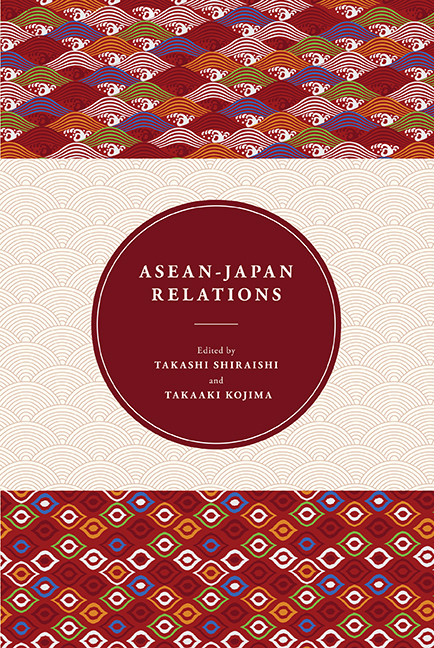Book contents
- Frontmatter
- Contents
- Preface
- About the Contributors
- 1 An Overview of Japan-ASEAN Relations
- 2 Japan's Relations with ASEAN
- 3 Approaches toward Regionalism: Japan, China and the Implications on ASEAN
- 4 The New Japan-ASEAN Partnership: Challenges in the Transformation of the Regional Context in East Asia
- 5 ASEAN-Japan Strategic Partnership and Regional Integration: Impacts and Implications
- 6 ASEAN-Japan Cooperation on Maritime Non-Traditional Security Issues: Toward a New Paradigm
- 7 Japan's Evolving Security Concerns in Maritime Southeast Asia: From Safety of Navigation to “Lake Beijing”
- 8 Evolution of Institutions and Policies for Economic Integration in East Asia: The Rise of China and Changes in the Regional Order
- 9 Managing Integration in East Asia: Behind Border Issues in Japan-ASEAN Trade Agreements
- 10 Regional Financial Cooperation in East Asia: Development and Challenges
- 11 Japanese Development Assistance to ASEAN Countries
- 12 Japanese Foreign Direct Investment in the ASEAN-4 Countries
- 13 Japan's Triple Tsunami
- 14 ASEAN-Japan Relations: A Singapore Perspective
13 - Japan's Triple Tsunami
Published online by Cambridge University Press: 21 October 2015
- Frontmatter
- Contents
- Preface
- About the Contributors
- 1 An Overview of Japan-ASEAN Relations
- 2 Japan's Relations with ASEAN
- 3 Approaches toward Regionalism: Japan, China and the Implications on ASEAN
- 4 The New Japan-ASEAN Partnership: Challenges in the Transformation of the Regional Context in East Asia
- 5 ASEAN-Japan Strategic Partnership and Regional Integration: Impacts and Implications
- 6 ASEAN-Japan Cooperation on Maritime Non-Traditional Security Issues: Toward a New Paradigm
- 7 Japan's Evolving Security Concerns in Maritime Southeast Asia: From Safety of Navigation to “Lake Beijing”
- 8 Evolution of Institutions and Policies for Economic Integration in East Asia: The Rise of China and Changes in the Regional Order
- 9 Managing Integration in East Asia: Behind Border Issues in Japan-ASEAN Trade Agreements
- 10 Regional Financial Cooperation in East Asia: Development and Challenges
- 11 Japanese Development Assistance to ASEAN Countries
- 12 Japanese Foreign Direct Investment in the ASEAN-4 Countries
- 13 Japan's Triple Tsunami
- 14 ASEAN-Japan Relations: A Singapore Perspective
Summary
INTRODUCTION
Over 20 years ago, in the fall of 1992, I published an article in Foreign Policy entitled “Japan Adrift”. As a friend of Japan, I warned that the post-Cold War era had created an uncomfortable geopolitical environment for Japan. I urged Japan to engage in fresh thinking and to change course. Sadly, my warnings were not heeded. Now, as a result of the failure to adapt over the past 20 years, Japan faces an even more difficult geopolitical environment. The goal of this essay is simple and clear: to save Japan from another 20 years of geopolitical drift.
In 1992, I began my essay with a Japanese folktale. Let me repeat it here: “A Japanese folktale tells of a young boy who lives in a coastal rice-farming village. One autumn morning, walking alone to work in the fields, he sees, to his horror, an approaching tsunami, which he knows will destroy the village. Knowing that he has no time to run down the hill to warn the villagers, he sets the rice fields on fire, sure that the desire to save their crops will draw all the villagers up the hill. The precious rice fields are sacrificed, but the villagers are saved from the tsunami” (Mahbubani 2005, p. 124). In this essay, I may make some inflammatory comments, but I hope my Japanese friends will understand that my goal is to help Japan.
In 2014, Japan will have to deal with not one tsunami but three. These three different tsunami will collide with one another and aggravate Japan's difficulties. The first tsunami is geopolitical. The new balance of power is working against Japan's interests. The second tsunami is political. At a time when Japan needs unified political leadership to cope with dramatic new challenges, the Japanese political system has never been more divided. The third tsunami is demographic. Japan has one of the fastest ageing populations in the entire world. Hence its relative “weight” in the international system will steadily decline. All these three great challenges will be discussed in detail in this paper.
Nonetheless, the conclusion of this paper is optimistic. Japan is not without options as it tries to steer a course in the 21st century.
- Type
- Chapter
- Information
- ASEAN-Japan Relations , pp. 266 - 283Publisher: ISEAS–Yusof Ishak InstitutePrint publication year: 2013

